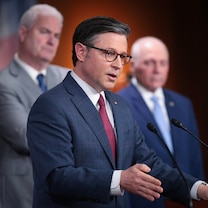Peace at Last for Two Koreas?
The end of the North-South summit has ended with promises of peace.
SEOUL, South Korea, Oct. 4, 2007 — -- A three-day summit between the leaders of North and South Korea ended with promised words of mutual cooperation and easing military tensions.
In a joint declaration, South Korean President Roh Moo-hyun and North Korean leader Kim Jong-Il pledged to bring peace by "cooperating closely to end military hostility and guarantee easing of tension and peace on the Korean peninsular."
North Korea has made similar pledges in the past but analysts are skeptical, saying they have often ignored these agreements when it suits them. "You could say this is a road map, saying you want peace in the Korean peninsula is nothing new, but making it concrete would take several months, years, if not decades," said Lee Jung-Min, professor of International Relations at Yonsei University in Seoul.
Both sides will hold defense ministers' talks in Pyongyang next month to discuss military confidence-building measures.
The agreement also called for a meeting on the Korean peninsula of a "three or four party summit of directly related sides" to "terminate the existing armistice regime" and "to pursue issues related to declaring the end of the Korean War." The 1953 armistice that ended the Korean War was signed by North Korea, China and the U.S.-led United Nations Command forces, but not by South Korea.
This means that technically the two Koreas are still at war.
President Bush said last month he is willing to discuss a formal end to the Korean War but only if Pyongyang continues to abide by its total nuclear disarmament.
North Korea on Wednesday has followed suit by announcing it will disable its main nuclear facilities by Dec. 31.
"Chairman Kim asked me to follow up with the idea of moving from an armistice to a peace treaty after I explained that President Bush is interested in a peace treaty," said Roh in an address to the nation after returning to the South.
Significant but not earth-shattering, the 10-point article is a win-win result for both leaders facing trouble at home. South Korea's lame-duck president Roh, whose term ends in just four months, has tried to dramatize this summit to boost his single-digit popularity rate.




